人教版九年级全一册 Unit 12 Life is full of the unexpected.Section A (Grammar Focus-4c) 课件 (共42张PPT)
文档属性
| 名称 | 人教版九年级全一册 Unit 12 Life is full of the unexpected.Section A (Grammar Focus-4c) 课件 (共42张PPT) | 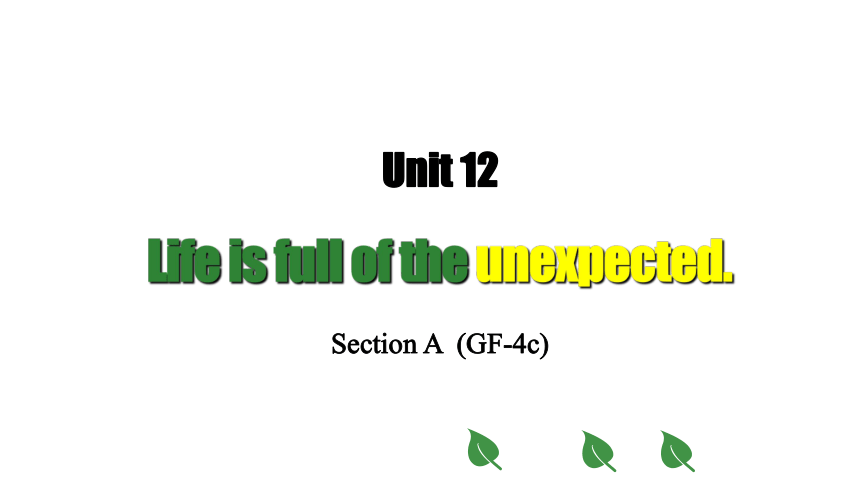 | |
| 格式 | pptx | ||
| 文件大小 | 6.3MB | ||
| 资源类型 | 教案 | ||
| 版本资源 | 人教新目标(Go for it)版 | ||
| 科目 | 英语 | ||
| 更新时间 | 2022-12-23 22:16:56 | ||
图片预览

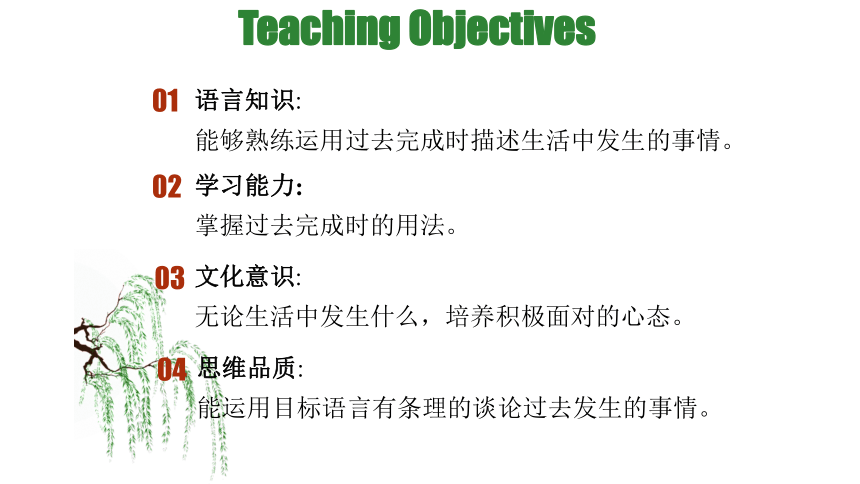
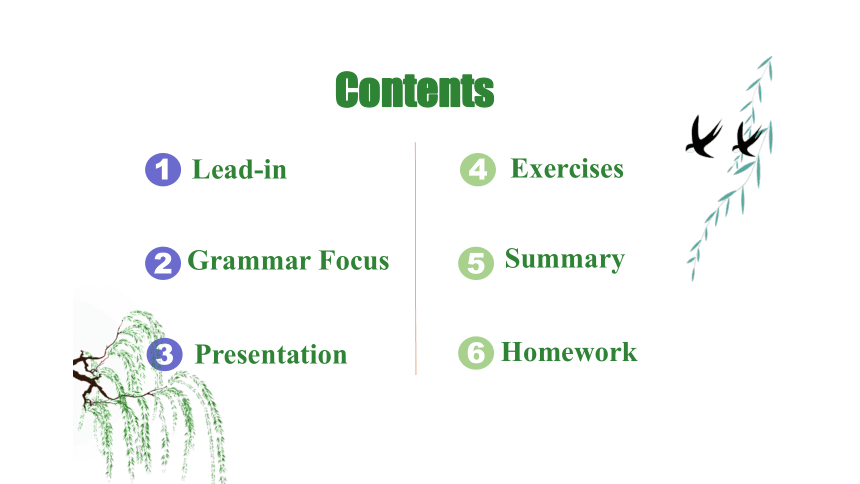

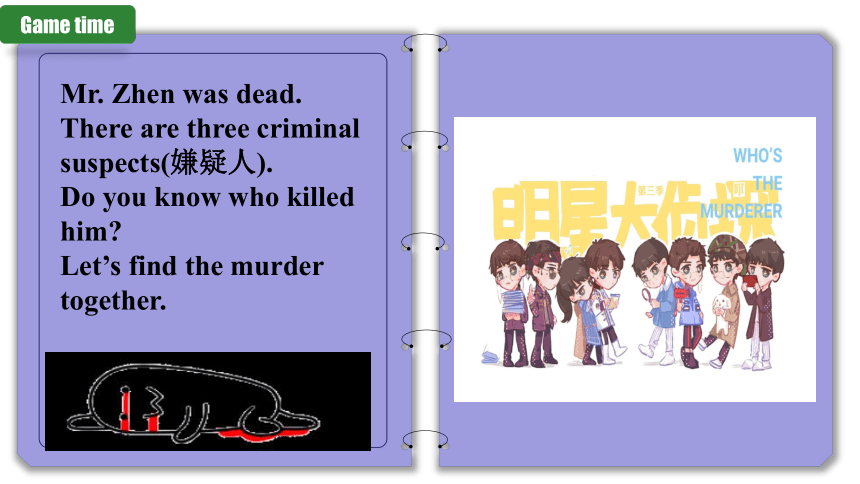

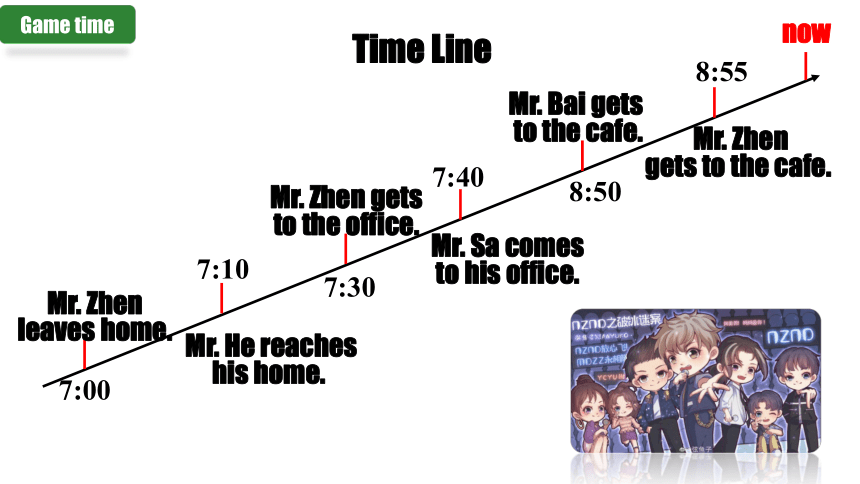
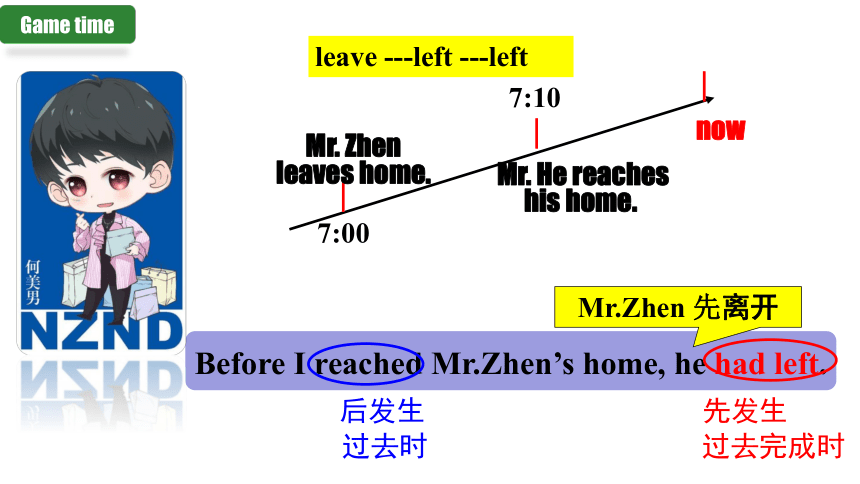

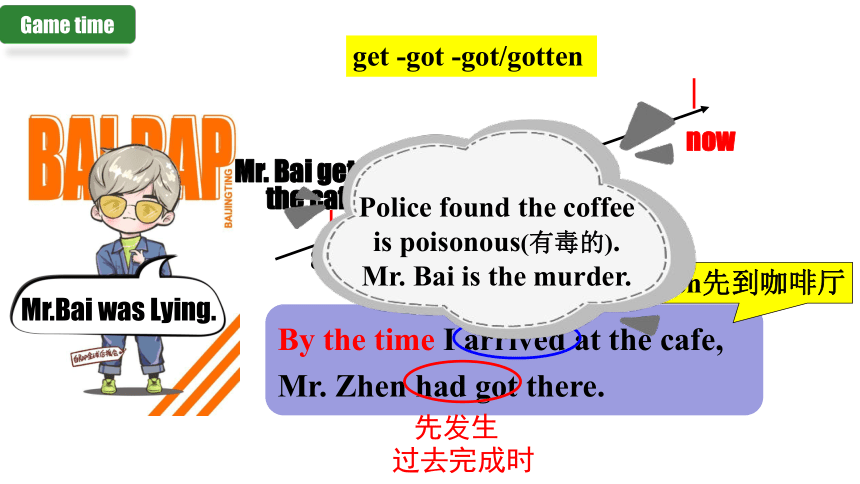

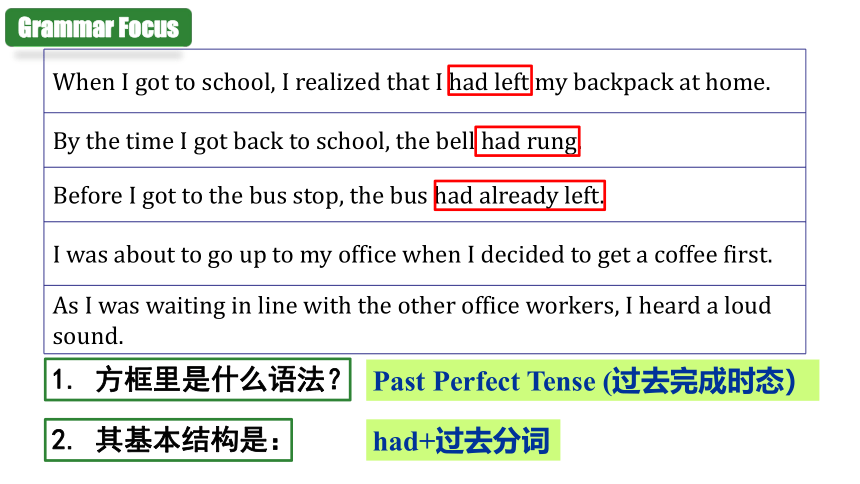
文档简介
(共42张PPT)
Section A (GF-4c)
Unit 12
Life is full of the unexpected.
Teaching Objectives
语言知识:
能够熟练运用过去完成时描述生活中发生的事情。
01
学习能力:
掌握过去完成时的用法。
02
文化意识:
无论生活中发生什么,培养积极面对的心态。
03
思维品质:
能运用目标语言有条理的谈论过去发生的事情。
04
Lead-in
1
Presentation
3
Homework
6
Grammar Focus
2
Exercises
4
Summary
5
Contents
01
Lead in
Game time
Mr. Zhen was dead.
There are three criminal suspects(嫌疑人).
Do you know who killed him
Let’s find the murder together.
Game time
three criminal suspects(嫌疑人)
Game time
7:10
7:00
Mr. He reaches
his home.
Mr. Zhen
leaves home.
7:40
7:30
Mr. Zhen gets
to the office.
now
Mr. Sa comes
to his office.
8:50
8:55
Mr. Zhen
gets to the cafe.
Mr. Bai gets
to the cafe.
Time Line
Game time
Before I reached Mr.Zhen’s home, he had left.
Mr.Zhen 先离开
leave ---left ---left
先发生
过去完成时
后发生
过去时
7:00
Mr. Zhen
leaves home.
now
7:10
Mr. He reaches
his home.
Game time
When I came to Mr.Zhen’s office,
He had arrived(arrive) there.
Mr.Sa先到办公室
先发生
过去完成时
后发生
过去时
arrive -arrived -arrived
7:40
7:30
Mr. Zhen comes to his office.
Mr. Sa gets to the office.
now
Game time
8.55
By the time I arrived at the cafe,
Mr. Zhen had got there.
先发生
过去完成时
后发生
过去时
get -got -got/gotten
Mr.Zhen先到咖啡厅
8:50
Mr. Zhen gets to café.
Mr. Bai gets to the café.
now
Mr.Bai was Lying.
Police found the coffee is poisonous(有毒的).
Mr. Bai is the murder.
02
Grammar Focus
Grammar Focus
When I got to school, I realized that I had left my backpack at home.
By the time I got back to school, the bell had rung.
Before I got to the bus stop, the bus had already left.
I was about to go up to my office when I decided to get a coffee first.
As I was waiting in line with the other office workers, I heard a loud sound.
Past Perfect Tense (过去完成时态)
1. 方框里是什么语法?
2. 其基本结构是:
had+过去分词
含义:
基本结构:
表示在过去某一时间或动作之前已经发生或完成了的动作。
助动词had+V-ed
Grammar Focus
Past Perfect Tense
主句为过去完成时,从句是一般过去时,
主句动作发生在从句之前。
Let’s learn more about it.
过去完成时由“助动词had (用于各种人称和数) + 过去分词”构成
过去的过去
过去某时
现在
将来
过去完成时
从过去之前的某个时间点到过去的某个时间点为止
(先发生)
(后发生)
1. 过去完成时的构成
2. 过去完成时的概念
过去完成时表示某动作或状态在过去某一时间或动作之前已经发生或完成,它表示动作发生的时间是“过去的过去”。
Grammar Focus
3. 过去完成时的句式类型
肯定句:主语+had +过去分词+…
否定句:主语+ hadn’t +过去分词+…
一般疑问句:Had +主语+过去分词…?
(Yes, 主语+had. / No, 主语+hadn’t.)
特殊疑问句:疑问词+had +主语+过去分词+…?
Grammar Focus
1. 由时间状语来判定
(1) by + 过去的时间点。
I had finished reading the novel by nine o'clock last night.
昨天晚上九点前我已经读完这本小说了。
(2) by the end of + 过去的时间点。
到...为止
(3) before + 过去的时间点。
在...之前
过去的过去,先发生
4. 过去完成时的判断依据
Grammar Focus
(1) 宾语从句中: 当宾语从句的主句为一般过去时,且从句的动作先于主句的动作时,从句要用过去完成时。在told, said, knew, heard, thought等动词后的宾语从句中。
如:
She said that she had seen the film before.
她说她以前看过这电影。
看电影是在她说之前做的。
4. 过去完成时的判断依据
Grammar Focus
2. 由“过去的过去”判定
(2) 状语从句 : 在时间、条件、 原因、 方式等状语从句中,
主、从句的动作发生有先后关系,动作在前的,要用过去完成时,动作在后的要用一般过去时。
如:
When I got to the station, the train had already left.
当我到达车站时,火车已经离开了。
2. 由“过去的过去”判定
火车离开发生在我到达车站之前。
4. 过去完成时的判断依据
Grammar Focus
注意:before, after 引导的时间状语从句中,由于 before 和 after 本身已表达了动作的先后关系,若主、从句表示的动作紧接着发生,则主、从句都用一般过去时。
如:
After he closed the door, he left the classroom.
他关上门,离开了教室。
4. 过去完成时的判断依据
Grammar Focus
2. 由“过去的过去”判定
5. 过去完成时与一般过去时的区别
过去完成时:强调“过去的过去”;
一般过去时:强调过去某一特定的时间。
①They had arrived at the station by ten yesterday.
他们昨天十点前就到车站了。
②They arrived at the station at ten yesterday.
他们昨天十点到了车站。
1. 时间状语不同
Grammar Focus
2. 在过去的时间中,哪个先发生,哪个后发生。
在没有明确的过去时间状语作标志时,谓语动词动作发生的时间先后须依据上下文来判断:
先发生的用过去完成时,后发生的则用一般过去时。
She was very happy. Her whole family were pleased with her, too. She had just won the first in the composition competition.
5. 过去完成时与一般过去时的区别
Grammar Focus
时态 概念 常见的时间状语 例句
一般过去时 在过去某个时间发生的动作或存在的状态。 yesterday, last week, ago, just now等 The film started ten minutes ago.
现在完成时 过去发生或已经发生的动作对现在造成的影响。 just, never, ever, so far, already, since, for等 The film has already started.
过去完成时 在过去某个时间或动作之前就已发生的动作,即表示动作发生的时间是“过去的过去”。 by the time+从句;by the end of last+时间段; before+过去时间状语等 By the time they arrived at the cinema, the film had started.
过去完成时与一般过去时、现在完成时的用法区别
Grammar Focus
现在完成时
此处的情境强调“离开”的动作对现在的影响:公交车已经离开,现在已不在公交车站,故用现在完成时。
The bus has already left.
过去完成时
此处的情境强调“我到达车站时,公交车已经离开”,即表示“公交离开”的动作发生在“到达车站”之前,即“过去的过去”,故用过去完成时。
When I got to the bus stop, the bus had already left.
一般过去时
此处的情境强调“公交离开”的动作是五分钟前发生的,故用一般过去时。
The bus left five minutes ago.
Grammar Focus
Grammar Focus
When I got to school, I realized that I had left my backpack at home.
By the time I got back to school, the bell had rung.
Before I got to the bus stop, the bus had already left.
I was about to go up to my office when I decided to get a coffee first.
As I was waiting in line with the other office workers, I heard a loud sound.
表示即将发生的动作
1. was about to do是什么意思?
2. was about to do ... when ...是什么意思?
be about to do, be doing等表示即将或正在做某事时,常用when引导从句表示突然发生的动作。
用法:表示即将发生的动作,在时间上指最近的将来。
We are about to finish our homework.
注意:在含有be about to do的句子中,不能再加时间状语。
Wrong: The medical team is about to start right now.
Right: The medical team is about to start.
Grammar Focus
be about to do sth.
拓展:be going to do sth.
It is going to rain soon. 快要下雨了。
He's going to buy a car.他打算买一辆车 (有这方面的计划,最后买不买不知道)。
1) 表示将要发生的事情或打算要进行的动作。
The football match will be put off if it rains tomorrow.
2) 在含有条件状语从句的主从复合句中,主句一般不用be going to,而常用will(第一人称用shall)。
Grammar Focus
be going to do sth
03
Presentation
Make sentences using by the time or before.
1. Tim went into the bathroom. Mary got up.
______________________________________________________________
2. The coffee became cold. I put cream in the coffee.
______________________________________________________________
3. The teacher collected the math homework. I got to school.
______________________________________________________________
By the time Mary got up, Tim had already gone into the bathroom.
Before I could put cream in the coffee, the coffee had become cold.
By the time I got to school, the teacher had collected the math homework.
4a
4. I completed the work for my boss. The workday ended.
______________________________________________________________
5. The movie started. I arrived at the cinema.
______________________________________________________________
6. My mother finished making the apple pie. I got home from my
language course.
______________________________________________________________
______________________________________________________________
I had completed the work for my boss before the workday ended.
The movie had already started before I arrived at the cinema.
By the time I got home from my language course, my mother had finished making the apple pie.
Make sentences using by the time or before.
4a
Fill in the blanks with the correct forms of the words in the box.
rush out forget arrive at
go into show up find out
By the time I arrived at the party, everyone else_______ already _________ .
2.When he put the noodles into a bowl, he realized he _____________to add the green beans.
3.By the time my mother came back from the market, I already ______________ the door to go for my piano lesson.
had
shown up
had forgotten
had rushed out
4b
4. Before she got to the airport, she _____________ about the earthquake.
5. When she __________ the movie theater, she remembered she had forgotten to feed her dog.
6. Before she got a chance to say goodbye,he____________ the building.
arrived at
had gone into
had forgotten
Fill in the blanks with the correct forms of the words in the box.
4b
rush out forget arrive at
go into show up find out
Write two true statements and one false statement about your day yesterday. Then ask your classmates to guess the false statement.
By the time I left for school in the morning, _______________.
By the end of the school day, ___________________________.
By dinner time, I _____________________________________.
4c
04
Exercises
( )1.By the end of 1976, many buildings _____built in the city.
A. have been B. have
C. had been D. will
( ) 2.We _________the work by six yesterday evening.
A. finished B.would finish
C. had finished D. had been finished
Exercise
一、单项选择
( )3.That dinner was the most expensive meal we___.
A. would have B. have had
C. had never had D. had ever had
( ) 4.Han Mei told me she _____lunch, so she was
very hungry.
A has had B hasn't have
C have had D hadn't had
从未吃过
还没有吃
Exercise
二、用括号中动词的正确时态填空。
1. He said he __________ (see)the movie already.
2. When he got to the cinema, the movie __________ (be) on for twenty minutes.
3. After Jim ____________ (finish)all his homework, he went to bed.
4. We ________________ (learn)20 English songs by the end of last month.
5. She ________ (arrive)before 7 o ’clock last night.
Exercise
had seen
had been
had finished
had learned/learnt
arrived
三、翻译下列句子
1. 当他到达学校的时候,老师已经开始上课了。
______________________________________________________________________
2. 当我出来的时候,我爸爸已经离开家了。
_____________________________________________________
3. 在汤姆拿书包以前我把门锁上了。
_________________________________________________________
4. 我爸爸告诉我他去过北京两次了。
_________________________________________________________
By the time he got to school, the teacher had already started teaching.
When I got outside, my father had left home.
My father told me (that)he had been to Beijing twice.
Before Tom got his schoolbag, I had locked the door.
Exercise
05
Summary
Summary
过
去
完
成
时
构成
“助动词had (用于各种人称和数) + 过去分词”
概念
过去完成时表示某动作或状态在过去某一时间或动作之前已经发生或完成,
它表示动作发生的时间是“过去的过去”。
句式
肯定句:主语+had +过去分词+…
否定句:主语+ hadn’t +过去分词+…
判断
依据
1. 由时间状语来判定
(1) by + 过去的时间点。
I had finished reading the novel by nine o'clock last night.
(2) by the end of + 过去的时间点。
到...为止
(3) before + 过去的时间点。
在...之前
2. 由“过去的过去”判定
(1) 宾语从句中: 当宾语从句的主句为一般过去时,且从句的动作先于主句的动作时,从句要用过去完成时。在told, said, knew, heard, thought等动词后的宾语从句。
如: She said that she had seen the film before.
(2) 状语从句 : 在时间、条件、 原因、 方式等状语从句中,主、从句的动作发生有先后关系,动作在前的,要用过去完成时,动作在后的要用一般过去时。
如:When I got to the station, the train had already left.
(3)注意:before, after 引导的时间状语从句中,由于 before 和 after 本身已表达了动作的先后关系,若主、从句表示的动作紧接着发生,则主、从句都用一般过去时。如: After he closed the door, he left the classroom.
特殊疑问句:疑问词+had +主语+过去分词+…?
一般疑问句:Had +主语+过去分词…?
(Yes, 主语+had. / No, 主语+hadn’t.)
06
Homework
Homework
Recite Grammar Focus.
Finish the exercises on the students’ book.
Preview 1a-1e on page 93.
Whatever problem we have in life, it will go away! Just smile!
Section A (GF-4c)
Unit 12
Life is full of the unexpected.
Teaching Objectives
语言知识:
能够熟练运用过去完成时描述生活中发生的事情。
01
学习能力:
掌握过去完成时的用法。
02
文化意识:
无论生活中发生什么,培养积极面对的心态。
03
思维品质:
能运用目标语言有条理的谈论过去发生的事情。
04
Lead-in
1
Presentation
3
Homework
6
Grammar Focus
2
Exercises
4
Summary
5
Contents
01
Lead in
Game time
Mr. Zhen was dead.
There are three criminal suspects(嫌疑人).
Do you know who killed him
Let’s find the murder together.
Game time
three criminal suspects(嫌疑人)
Game time
7:10
7:00
Mr. He reaches
his home.
Mr. Zhen
leaves home.
7:40
7:30
Mr. Zhen gets
to the office.
now
Mr. Sa comes
to his office.
8:50
8:55
Mr. Zhen
gets to the cafe.
Mr. Bai gets
to the cafe.
Time Line
Game time
Before I reached Mr.Zhen’s home, he had left.
Mr.Zhen 先离开
leave ---left ---left
先发生
过去完成时
后发生
过去时
7:00
Mr. Zhen
leaves home.
now
7:10
Mr. He reaches
his home.
Game time
When I came to Mr.Zhen’s office,
He had arrived(arrive) there.
Mr.Sa先到办公室
先发生
过去完成时
后发生
过去时
arrive -arrived -arrived
7:40
7:30
Mr. Zhen comes to his office.
Mr. Sa gets to the office.
now
Game time
8.55
By the time I arrived at the cafe,
Mr. Zhen had got there.
先发生
过去完成时
后发生
过去时
get -got -got/gotten
Mr.Zhen先到咖啡厅
8:50
Mr. Zhen gets to café.
Mr. Bai gets to the café.
now
Mr.Bai was Lying.
Police found the coffee is poisonous(有毒的).
Mr. Bai is the murder.
02
Grammar Focus
Grammar Focus
When I got to school, I realized that I had left my backpack at home.
By the time I got back to school, the bell had rung.
Before I got to the bus stop, the bus had already left.
I was about to go up to my office when I decided to get a coffee first.
As I was waiting in line with the other office workers, I heard a loud sound.
Past Perfect Tense (过去完成时态)
1. 方框里是什么语法?
2. 其基本结构是:
had+过去分词
含义:
基本结构:
表示在过去某一时间或动作之前已经发生或完成了的动作。
助动词had+V-ed
Grammar Focus
Past Perfect Tense
主句为过去完成时,从句是一般过去时,
主句动作发生在从句之前。
Let’s learn more about it.
过去完成时由“助动词had (用于各种人称和数) + 过去分词”构成
过去的过去
过去某时
现在
将来
过去完成时
从过去之前的某个时间点到过去的某个时间点为止
(先发生)
(后发生)
1. 过去完成时的构成
2. 过去完成时的概念
过去完成时表示某动作或状态在过去某一时间或动作之前已经发生或完成,它表示动作发生的时间是“过去的过去”。
Grammar Focus
3. 过去完成时的句式类型
肯定句:主语+had +过去分词+…
否定句:主语+ hadn’t +过去分词+…
一般疑问句:Had +主语+过去分词…?
(Yes, 主语+had. / No, 主语+hadn’t.)
特殊疑问句:疑问词+had +主语+过去分词+…?
Grammar Focus
1. 由时间状语来判定
(1) by + 过去的时间点。
I had finished reading the novel by nine o'clock last night.
昨天晚上九点前我已经读完这本小说了。
(2) by the end of + 过去的时间点。
到...为止
(3) before + 过去的时间点。
在...之前
过去的过去,先发生
4. 过去完成时的判断依据
Grammar Focus
(1) 宾语从句中: 当宾语从句的主句为一般过去时,且从句的动作先于主句的动作时,从句要用过去完成时。在told, said, knew, heard, thought等动词后的宾语从句中。
如:
She said that she had seen the film before.
她说她以前看过这电影。
看电影是在她说之前做的。
4. 过去完成时的判断依据
Grammar Focus
2. 由“过去的过去”判定
(2) 状语从句 : 在时间、条件、 原因、 方式等状语从句中,
主、从句的动作发生有先后关系,动作在前的,要用过去完成时,动作在后的要用一般过去时。
如:
When I got to the station, the train had already left.
当我到达车站时,火车已经离开了。
2. 由“过去的过去”判定
火车离开发生在我到达车站之前。
4. 过去完成时的判断依据
Grammar Focus
注意:before, after 引导的时间状语从句中,由于 before 和 after 本身已表达了动作的先后关系,若主、从句表示的动作紧接着发生,则主、从句都用一般过去时。
如:
After he closed the door, he left the classroom.
他关上门,离开了教室。
4. 过去完成时的判断依据
Grammar Focus
2. 由“过去的过去”判定
5. 过去完成时与一般过去时的区别
过去完成时:强调“过去的过去”;
一般过去时:强调过去某一特定的时间。
①They had arrived at the station by ten yesterday.
他们昨天十点前就到车站了。
②They arrived at the station at ten yesterday.
他们昨天十点到了车站。
1. 时间状语不同
Grammar Focus
2. 在过去的时间中,哪个先发生,哪个后发生。
在没有明确的过去时间状语作标志时,谓语动词动作发生的时间先后须依据上下文来判断:
先发生的用过去完成时,后发生的则用一般过去时。
She was very happy. Her whole family were pleased with her, too. She had just won the first in the composition competition.
5. 过去完成时与一般过去时的区别
Grammar Focus
时态 概念 常见的时间状语 例句
一般过去时 在过去某个时间发生的动作或存在的状态。 yesterday, last week, ago, just now等 The film started ten minutes ago.
现在完成时 过去发生或已经发生的动作对现在造成的影响。 just, never, ever, so far, already, since, for等 The film has already started.
过去完成时 在过去某个时间或动作之前就已发生的动作,即表示动作发生的时间是“过去的过去”。 by the time+从句;by the end of last+时间段; before+过去时间状语等 By the time they arrived at the cinema, the film had started.
过去完成时与一般过去时、现在完成时的用法区别
Grammar Focus
现在完成时
此处的情境强调“离开”的动作对现在的影响:公交车已经离开,现在已不在公交车站,故用现在完成时。
The bus has already left.
过去完成时
此处的情境强调“我到达车站时,公交车已经离开”,即表示“公交离开”的动作发生在“到达车站”之前,即“过去的过去”,故用过去完成时。
When I got to the bus stop, the bus had already left.
一般过去时
此处的情境强调“公交离开”的动作是五分钟前发生的,故用一般过去时。
The bus left five minutes ago.
Grammar Focus
Grammar Focus
When I got to school, I realized that I had left my backpack at home.
By the time I got back to school, the bell had rung.
Before I got to the bus stop, the bus had already left.
I was about to go up to my office when I decided to get a coffee first.
As I was waiting in line with the other office workers, I heard a loud sound.
表示即将发生的动作
1. was about to do是什么意思?
2. was about to do ... when ...是什么意思?
be about to do, be doing等表示即将或正在做某事时,常用when引导从句表示突然发生的动作。
用法:表示即将发生的动作,在时间上指最近的将来。
We are about to finish our homework.
注意:在含有be about to do的句子中,不能再加时间状语。
Wrong: The medical team is about to start right now.
Right: The medical team is about to start.
Grammar Focus
be about to do sth.
拓展:be going to do sth.
It is going to rain soon. 快要下雨了。
He's going to buy a car.他打算买一辆车 (有这方面的计划,最后买不买不知道)。
1) 表示将要发生的事情或打算要进行的动作。
The football match will be put off if it rains tomorrow.
2) 在含有条件状语从句的主从复合句中,主句一般不用be going to,而常用will(第一人称用shall)。
Grammar Focus
be going to do sth
03
Presentation
Make sentences using by the time or before.
1. Tim went into the bathroom. Mary got up.
______________________________________________________________
2. The coffee became cold. I put cream in the coffee.
______________________________________________________________
3. The teacher collected the math homework. I got to school.
______________________________________________________________
By the time Mary got up, Tim had already gone into the bathroom.
Before I could put cream in the coffee, the coffee had become cold.
By the time I got to school, the teacher had collected the math homework.
4a
4. I completed the work for my boss. The workday ended.
______________________________________________________________
5. The movie started. I arrived at the cinema.
______________________________________________________________
6. My mother finished making the apple pie. I got home from my
language course.
______________________________________________________________
______________________________________________________________
I had completed the work for my boss before the workday ended.
The movie had already started before I arrived at the cinema.
By the time I got home from my language course, my mother had finished making the apple pie.
Make sentences using by the time or before.
4a
Fill in the blanks with the correct forms of the words in the box.
rush out forget arrive at
go into show up find out
By the time I arrived at the party, everyone else_______ already _________ .
2.When he put the noodles into a bowl, he realized he _____________to add the green beans.
3.By the time my mother came back from the market, I already ______________ the door to go for my piano lesson.
had
shown up
had forgotten
had rushed out
4b
4. Before she got to the airport, she _____________ about the earthquake.
5. When she __________ the movie theater, she remembered she had forgotten to feed her dog.
6. Before she got a chance to say goodbye,he____________ the building.
arrived at
had gone into
had forgotten
Fill in the blanks with the correct forms of the words in the box.
4b
rush out forget arrive at
go into show up find out
Write two true statements and one false statement about your day yesterday. Then ask your classmates to guess the false statement.
By the time I left for school in the morning, _______________.
By the end of the school day, ___________________________.
By dinner time, I _____________________________________.
4c
04
Exercises
( )1.By the end of 1976, many buildings _____built in the city.
A. have been B. have
C. had been D. will
( ) 2.We _________the work by six yesterday evening.
A. finished B.would finish
C. had finished D. had been finished
Exercise
一、单项选择
( )3.That dinner was the most expensive meal we___.
A. would have B. have had
C. had never had D. had ever had
( ) 4.Han Mei told me she _____lunch, so she was
very hungry.
A has had B hasn't have
C have had D hadn't had
从未吃过
还没有吃
Exercise
二、用括号中动词的正确时态填空。
1. He said he __________ (see)the movie already.
2. When he got to the cinema, the movie __________ (be) on for twenty minutes.
3. After Jim ____________ (finish)all his homework, he went to bed.
4. We ________________ (learn)20 English songs by the end of last month.
5. She ________ (arrive)before 7 o ’clock last night.
Exercise
had seen
had been
had finished
had learned/learnt
arrived
三、翻译下列句子
1. 当他到达学校的时候,老师已经开始上课了。
______________________________________________________________________
2. 当我出来的时候,我爸爸已经离开家了。
_____________________________________________________
3. 在汤姆拿书包以前我把门锁上了。
_________________________________________________________
4. 我爸爸告诉我他去过北京两次了。
_________________________________________________________
By the time he got to school, the teacher had already started teaching.
When I got outside, my father had left home.
My father told me (that)he had been to Beijing twice.
Before Tom got his schoolbag, I had locked the door.
Exercise
05
Summary
Summary
过
去
完
成
时
构成
“助动词had (用于各种人称和数) + 过去分词”
概念
过去完成时表示某动作或状态在过去某一时间或动作之前已经发生或完成,
它表示动作发生的时间是“过去的过去”。
句式
肯定句:主语+had +过去分词+…
否定句:主语+ hadn’t +过去分词+…
判断
依据
1. 由时间状语来判定
(1) by + 过去的时间点。
I had finished reading the novel by nine o'clock last night.
(2) by the end of + 过去的时间点。
到...为止
(3) before + 过去的时间点。
在...之前
2. 由“过去的过去”判定
(1) 宾语从句中: 当宾语从句的主句为一般过去时,且从句的动作先于主句的动作时,从句要用过去完成时。在told, said, knew, heard, thought等动词后的宾语从句。
如: She said that she had seen the film before.
(2) 状语从句 : 在时间、条件、 原因、 方式等状语从句中,主、从句的动作发生有先后关系,动作在前的,要用过去完成时,动作在后的要用一般过去时。
如:When I got to the station, the train had already left.
(3)注意:before, after 引导的时间状语从句中,由于 before 和 after 本身已表达了动作的先后关系,若主、从句表示的动作紧接着发生,则主、从句都用一般过去时。如: After he closed the door, he left the classroom.
特殊疑问句:疑问词+had +主语+过去分词+…?
一般疑问句:Had +主语+过去分词…?
(Yes, 主语+had. / No, 主语+hadn’t.)
06
Homework
Homework
Recite Grammar Focus.
Finish the exercises on the students’ book.
Preview 1a-1e on page 93.
Whatever problem we have in life, it will go away! Just smile!
同课章节目录
- Unit 1 How can we become good learners.
- Section A
- Section B
- Unit 2 I think that mooncakes are delicious!
- Section A
- Section B
- Unit 3 Could you please tell me where the restroom
- Section A
- Section B
- Unit 4 I used to be afraid of the dark.
- Section A
- Section B
- Unit 5 What are the shirts made of?
- Section A
- Section B
- Review of Units 1-5
- Unit 6 When was it invented?
- Section A
- Section B
- Unit 7 Teenagers should be allowed to choose their
- Section A
- Section B
- Unit 8 It must belong to Carla.
- Section A
- Section B
- Unit 9 I like music that I can dance to.
- Section A
- Section B
- Unit 10 You're supposed to shake hands.
- Section A
- Section B
- Review of Units 6-10
- Unit 11 Sad movies make me cry.
- Section A
- Section B
- Unit 12 Life is full of the unexpected
- Section A
- Section B
- Unit 13 We're trying to save the earth!
- Section A
- Section B
- Unit 14 I remember meeting all of you in Grade 7.
- Section A
- Section B
- Review of Units 11-14
